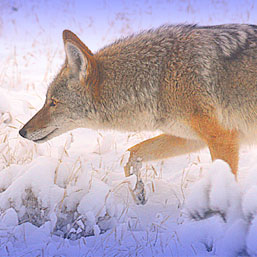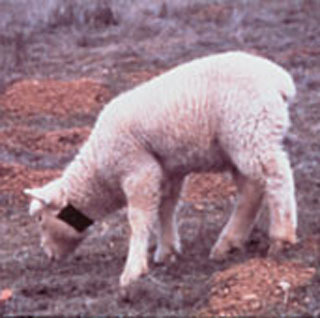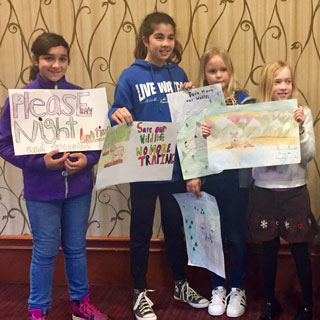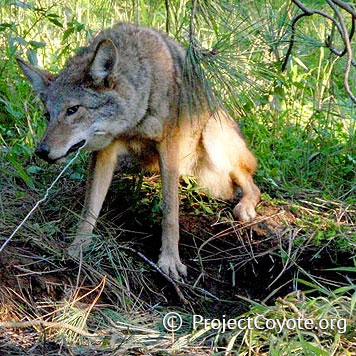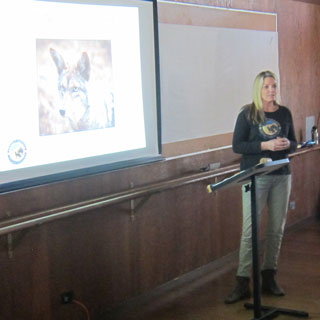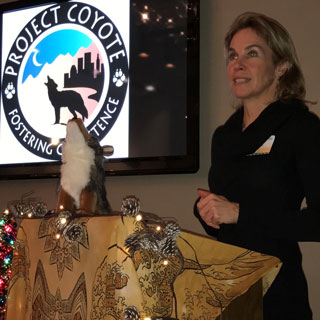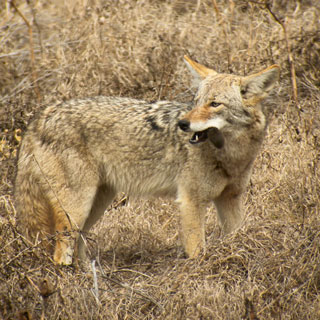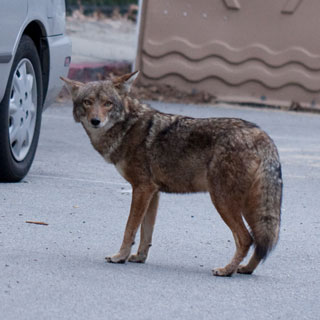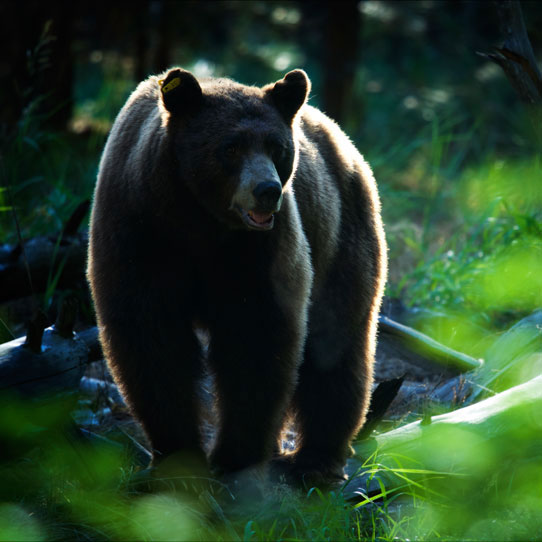FEBRUARY 2017
IN THIS ISSUE:
- Banning Coyote Killing Contests In New Mexico
- Petitioning The Epa To Ban Compound 1080
- Pressing For Reform Of Predator Management In California
- Challenging Arcadia, California’s Decision To Trap & Kill Coyotes
- Honoring Keli Hendricks ~ Guardian Of The Pack Award
- Camilla Fox Receives The Grassroots Activist Of The Year Award
- Other News…
FEBRUARY 2017
In these uncertain times—particularly regarding the fate of our planet and all of the species with whom we share the earth—I am heartened that grassroots activism is alive and well in America.
As a Project Coyote supporter, you know that Project Coyote creates positive change in wildlife conservation and stewardship by engaging in grassroots community organizing at the state and local levels. This strategy has played a significant role in Project Coyote’s successful advocacy of compassionate coexistence.
While we believe that in our nation’s current political climate systemic improvements for wildlife will largely emanate from the state and local levels, we know too that we must continue to push for systemic change at the federal level. Read below about our coalition’s efforts to limit the use of deadly poisons by formally petitioning the EPA to ban Compound 1080.
In this issue of Coyote Chronicles, we present examples of Project Coyote’s ongoing grassroots activism: we share news of our campaigns to ban coyote killing contests in New Mexico and coyote trapping in Arcadia, California; and we recount our most recent appearance before the California Fish and Wildlife Commission to renew our supporters’ demands that the state raise fees for fur trapping and that it ban trapping and shooting in wolf recovery zones.
Closer to home, I am very pleased to let you know that volunteers Keli Hendricks and Fauna Tomlinson were recognized for their exceptional contributions to Project Coyote’s community education and advocacy efforts with our Guardian of the Pack award during our December 2016 Holiday Benefit Party. Learn more about Keli and her work for wildlife as Project Coyote’s Ranching with Wildlife Coordinator and as a wildlife rehabber below. We look forward to sharing more about Fauna’s background and ongoing activities in our next issue of Coyote Chronicles.
Today the Project Coyote team is out in full force: Rick Hopkins travels to Sacramento today for a Predator Policy Working Group meeting representing Project Coyote as a carnivore biologist on that California Commission appointed task force; Judy Paulsen travels to Santa Fe for a hearing on a bill to ban trapping on public lands; Randi Feilich travels to Arcadia, California to speak out against coyote trapping and killing; members of our team travel to Reno, Nevada to support a bill to amend the predator killing fee that has been an all-out assault on mountain lions and coyotes and I’ll be part of meeting regarding our lawsuit concerning USDA Wildlife Services activities in Mendocino County.
And don’t forget to take a look at some recent coverage of wildlife predators in our In the Media section at the bottom of this issue of Coyote Chronicles. You can always find more related and current news on our website here.
I hope you will be encouraged and inspired by the work and individuals featured here. And please share this issue of Coyote Chronicles with others who may be inspired to join Project Coyote’s pack.
For the Wild,
Camilla H. Fox
Founder & Executive Director
BANNING COYOTE KILLING CONTESTS IN NEW MEXICO
Good news! On February 16th, SB 268 (authored by New Mexico Senator Jeff Steinborn (D-Las Cruces) and Senator Mark Moores (R-Albuquerque)) that would ban coyote killing contests statewide passed the Senate Conservation Committee by a bipartisan 6 to 3 vote. Project Coyote Science Advisory Board member Dave Parsons served as Senator Steinborn’s expert scientist at the committee hearing, and Project Coyote supporters showed up to testify and lend their support to the bill. With its introduction in the 2017 legislative session, SB 268 aims to stop the dozens of organized competitions held annually in New Mexico, in which participants compete for prizes for killing the most coyotes or the largest. Prior to introduction of the bill, Project Coyote and our campaign partners helped raise New Mexicans’ awareness of the issue with a multi-city premiere screening of Project Coyote’s documentary film Unfair Game: Ending Wildlife Killing Contests. Read more here and here.
PETITIONING THE EPA TO BAN COMPOUND 1080
On January 12, Project Coyote joined the Animal Welfare Institute and three other animal protection and wildlife conservation organizations in petitioning the Environmental Protection Agency (EPA), making the case that the agency should cancel its registration for sodium fluoroacetate, a pesticide commonly known as Compound 1080. Currently, the pesticide is permitted for use in “livestock protection collars”—one of the devices that agents of the U.S. Department of Agriculture’s Wildlife Services program use to kill thousands of coyotes each year. The coalition is requesting that the EPA suspend and ultimately cancel the registration for Compound 1080 due to its violation of the Federal Insecticide, Fungicide, and Rodenticide Act (FIFRA). According to the petition, because coyotes have never been declared a pest or found to be “injurious to health or the environment,” as defined under FIFRA, pesticides (including Compound 1080) cannot lawfully be used to kill coyotes. Read more here.
PRESSING FOR REFORM OF PREDATOR MANAGEMENT IN CALIFORNIA
On February 8th, Project Coyote representatives, volunteers and friends, along with our partners at the Center for Biological Diversity, testified before the California Fish and Game Commission to argue for reconsideration of two formal petitions we had presented to the Commission in 2015, neither of which the Commission nor the Department of Fish and Wildlife has yet addressed. One petition calls for a ban on trapping and night-hunting in the wolf recovery zone. The other petition asks the state to begin complying with its mandated fee structure for fur trappers, which requires that fees collected cover the cost of overseeing the trapping program—the alternative would be to suspend the program altogether, which would save the state money, given that fewer than 100 residents actively trap animals for fur in California. You can still add your signature to our Change.org petitions here and here. Moving forward, we will keep you apprised of the status of these petitions.
I’m heartened to report that many of our supporters came to and even testified at the Commission meeting—including Laura Honda, a teacher at Manor Elementary School in Fairfax California, and 12 of her 4th grade students, known as the “Green Team” because of their extracurricular conservation activities. Laura’s class is part of Project Coyote’s Keeping It Wild program, which fosters young people’s awareness of the natural world, their understanding of the intrinsic value of wildlife, and their appreciation of the role wildlife plays in biodiversity and healthy ecosystems. Keeping It Wild actively engages students on issues they care about by encouraging them to design their own community service projects—such as testifying on behalf of wildlife. You can watch the Green Team in action at the Commission meeting here.
CHALLENGING ARCADIA, CALIFORNIA’S DECISION TO TRAP & KILL COYOTES
On February 7th, the Arcadia, California City Council voted unanimously to start trapping and killing the city’s coyotes in response to complaints from residents about the animal’s’ presence. This decision directly contravenes the city’s non-lethal approach with coyotes that has been in place since 2011 which has emphasized education and coexistence. The city has approved the expenditure of $20,000 of Arcadia’s tax dollars to hire a trapper—funds that would be better spent on proactively educating residents on simple approaches to peacefully coexist with urban wildlife. In addition to being unnecessarily inhumane, trapping has been shown to upset coyotes’ social structure, which may result in an increase in the coyote population and in turn, the frequency of neighborhood encounters. Working with allies in Southern California, Project Coyote is urging the city to maintain a coyote management plan that is more effective in the long term, as well as more ethical and ecologically sound, offering our Coyote Friendly Communities™ program resources and services. Read our news release here, our letter to the Arcadia City Council and Mayor here and our action alert sent to California residents here.
HONORING KELI HENDRICKS ~ GUARDIAN OF THE PACK AWARD
In our recent interview of Keli Hendricks, one of two volunteers to have been presented with Project Coyote’s first annual Guardian of the Pack Award in December, we learn about Keli’s background caring for and working on behalf of animals and wildlife, her role as Project Coyote’s Ranching with Wildlife Coordinator, and her insights into human/predator relations as a cattle rancher. In addition to her coordinating our ranching program, Keli plays a lead role in representing Project Coyote at community forums in Northern California, where she educates residents and officials on proven methods for keeping families, pets and livestock safe while peacefully coexisting with neighboring wildlife. Learn more about Keli’s presentations here and read her interview here and an earlier interview with her here about testing Foxlight predator deterrents.
CAMILLA FOX RECEIVES THE GRASSROOTS ACTIVIST OF THE YEAR AWARD
In December, Marnie Gaede, Board President of the Fund for Wild Nature, honored Project Coyote Founder and Executive Director Camilla Fox with the Grassroots Activist of the Year Award for her outstanding efforts and dedication to the protection of wildlife predators. Marnie braved a torrential storm as she traveled from Southern California to Mill Valley to attend Project Coyote’s 2016 holiday benefit, where she presented Camilla with the Foundation’s Golden Badger statue and a $1,000 check. The Fund for Wild Nature describes its grantmaking strategy as an investment in “cutting-edge grassroots organizations and innovative conservation efforts that meet emerging needs for protecting biodiversity and wilderness.” On receiving the award, Camilla expressed her gratitude for having the work that is her life’s passion and calling recognized in this way by the Fund for Wild Nature, and reaffirmed Project Coyote’s commitment to advocate for North America’s most maligned and misunderstood native carnivores. Read more here and this article about Camilla’s award written by Counterpunch investigative journalist and editor and Fund for Wild Nature board member Jeffrey St. Clair here.
OTHER NEWS
Editorial: 3 Wildlife Bills Cost Zero, Provide Moral High Ground
There is a trio of wildlife bills proposed this legislative session that would cost the state – and thus taxpayers – nothing in cash while earning them the moral high ground when it comes to respecting New Mexico’s wildlife and ecosystems, which belong to those same taxpayers. Read More
Reader View: Coyote-killing Contests in the Land of Enchantment
Most people are shocked to learn that the practice of indiscriminately killing wildlife as part of a tournament for prizes and “recreational fun” is common and legal right here in the Land of Enchantment. Read more
Compassionate Coexistence with Predators
Coexisting with America’s Song Dog, with Camilla Fox and Robert Crabtree America’s Song Dog, the Trickster, of mythological status to Native Americans; Clever and intelligent, they are critical players in ecosystem health, yet they are the most persecuted. Listen here
Join our E-TEAM
Get periodic e-news, action alerts, and join our growing network of educators, scientists, predator friendly ranchers and citizen leaders who are helping people and wildlife coexist in our communities.
My Turn: Let the coyote do what it does
Rep. John Klose, who sits on the House Fish and Game Committee, suggested extending nighttime hunting of coyotes, and exhibits a profound misunderstanding of the role of predators and a personal disdain for coyotes. Read more
Cities Want to Kill Coyotes — and Animal Welfare Activists Cry Foul
Coyotes are one of the most visible signs that Greater Los Angeles is still a wild place. They’re known to stroll into some of the densest L.A. neighborhoods — Echo Park, Hollywood, Westlake — and remind us that nature is still boss. Read more
Message for the New Year: Why We Must Care for Animals and the Environment
The rights and welfare of animals and the protection of endangered species and their threatened habitats were never mentioned in all the various political debates I heard this year in America. Read more
Join a growing community of educated and empowered citizens by expressing your commitment to compassionate conservation with a financial investment.
You can DONATE, become a SPONSOR or leave a LEGACY GIFT.


